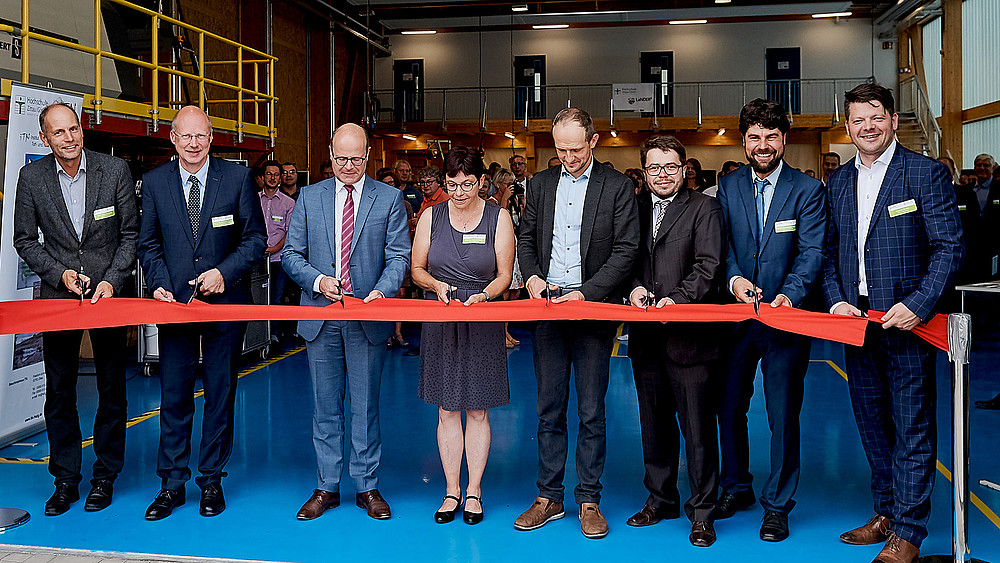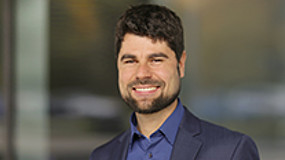The new interdisciplinary research technology center in Zittau provides space for personnel and technology from various sub-projects.

On August 28, 2019, the Zittau/Görlitz University of Applied Sciences (HSZG) was officially opened in the presence of the Head of the Saxon State Chancellery, Minister of State Oliver Schenk, Dr. Stephan Meyer, Member of the Saxon State Parliament, Prof. Welf-Guntram Drossel, Director of the Fraunhofer Institute for Machine Tools and Forming Technology IWU, Prof. Miroslav Brzezina, Rector of the Liberec University of Technology and cross-border partner of the HSZG, Thomas Zenker, Mayor of the City of Zittau, Alexander Jakschik, Managing Director of ULT AG. Miroslav Brzezina, Rector of the TU Liberec and cross-border partner of the HSZG, Mr. Thomas Zenker, Mayor of Zittau, Mr. Alexander Jakschik, Managing Director of ULT AG, partner company and member of the LaNDER³ advisory board, opened the LaNDER3 hall as a new interdisciplinary research technology centre. Numerous domestic and foreign guests from industry, science and society as well as stakeholders from the impulse partnership were welcomed to this event.
In the LaNDER³ partnership (Lausitz Natural Fiber Composites: Decentralized Energy, Raw Materials, Resources, Recycling), scientists from Zittau/Görlitz University of Applied Sciences have been working together with more than 20 predominantly regional partner companies and eight scientific partners since 2017 on solutions for the resource-efficient and competitive processing and recycling of natural fiber-reinforced plastics (NFRP). The project partners want to develop efficient technologies and open up new areas of application for these sustainable and lightweight materials. This should make an important contribution to climate protection and saving valuable resources.
The LaNDER3 partners have committed to the construction of a specialized research pilot plant in order to develop and link the machinery and plant technology required for the production, processing and analysis of NFRP components. Additional funding of 1.5 million euros from the Free State of Saxony made it possible to build the new technical center. This interdisciplinary partnership laboratory provides space for personnel and technology from the various LaNDER³ sub-projects.
The LaNDER³ hall thus brings together excellent application-oriented research and economic interests in one place. The entire NFRP process chain can be mapped and holistically researched in a very small space: from fibre extraction, fibre preparation and functionalization to the energy-efficient production of NFRP components, recycling and reuse.
There is great interest from regional companies in collaborating with the Zittau/Görlitz University of Applied Sciences in the field of natural fibre-reinforced plastics. This is demonstrated not only by the great financial support of many companies, but also by the provision of plant and machine technology for the success of the LaNDER³ project objectives. These machines will also find a home in the new LaNDER3 technical center. One of them, for example, is a sorting machine from RTT Steinert GmbH in Zittau for researching recycling processes for NFRP components.
The joint research hall was built in just one and a half years and is visible proof of the far-reaching and long-term impact of the strategic partnerships that have been established to date as part of the BMBF project by FH Impuls.
In 2016, the Zittau/Görlitz University of Applied Sciences was one of ten selected from 80 applicants and received more than five million euros from the BMBF's "Strong universities of applied sciences - impetus for the region" (FH-Impuls) funding measure. Furthermore, primarily regional companies are supporting the project with additional funding of €980 thousand.
The special thing about LaNDER³ is that the federal government can fund the project for up to eight years. Often you only have two or three years. It is difficult to produce a market-ready product in such a short time. In eight years, however, it is realistic to develop innovative products and publish the research results. The LaNDER³ project is currently in the four-year development phase. After that, the university can and will apply for a further four years of funding.
Natural fibers from regionally available biomass, economically broken down using residual materials, converted into high-tech composites as lightweight, resilient materials in an energy-efficient manner into ready-to-use components, functionally coated and recyclable - all steps optimally supplied with energy within the process - that is the goal. The partnership is thus revolutionizing the entire product life cycle of natural fibre reinforced plastics (NFRP).
